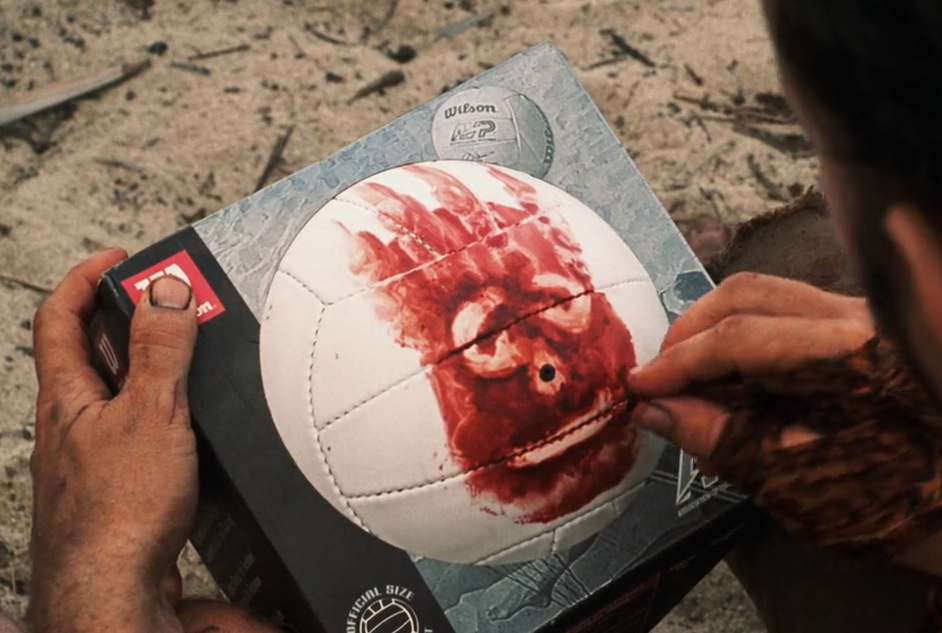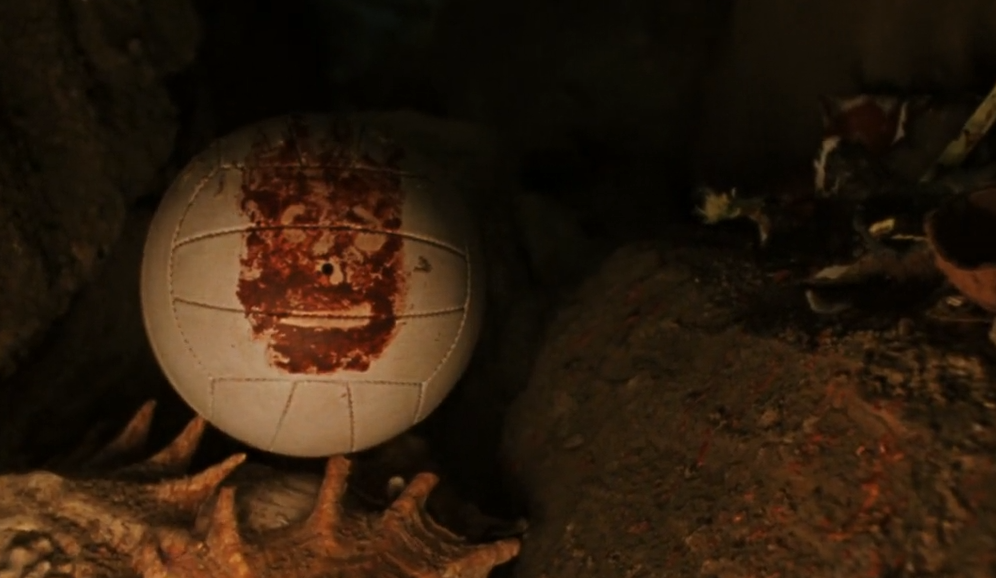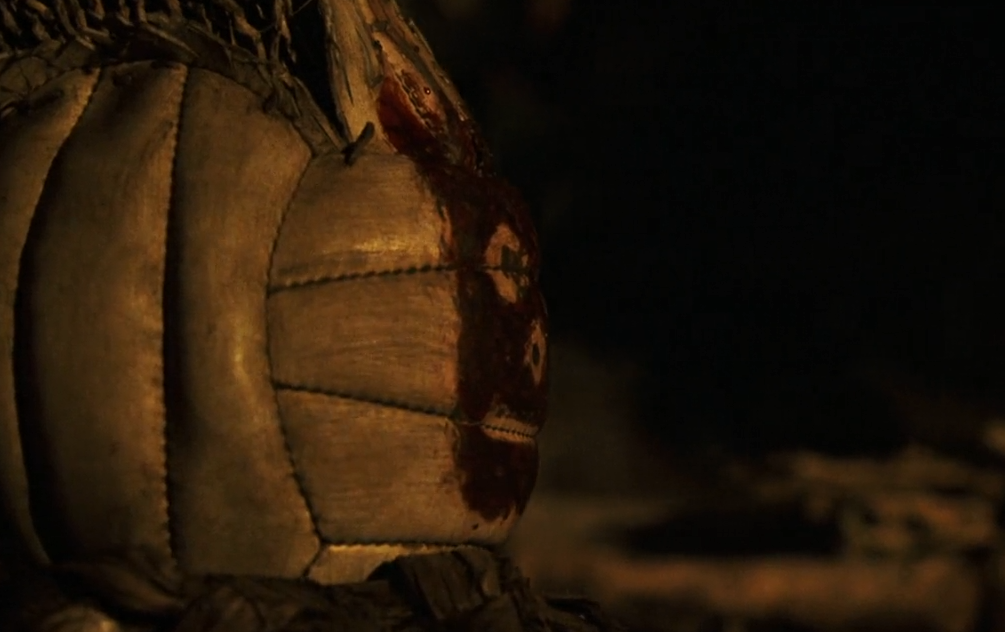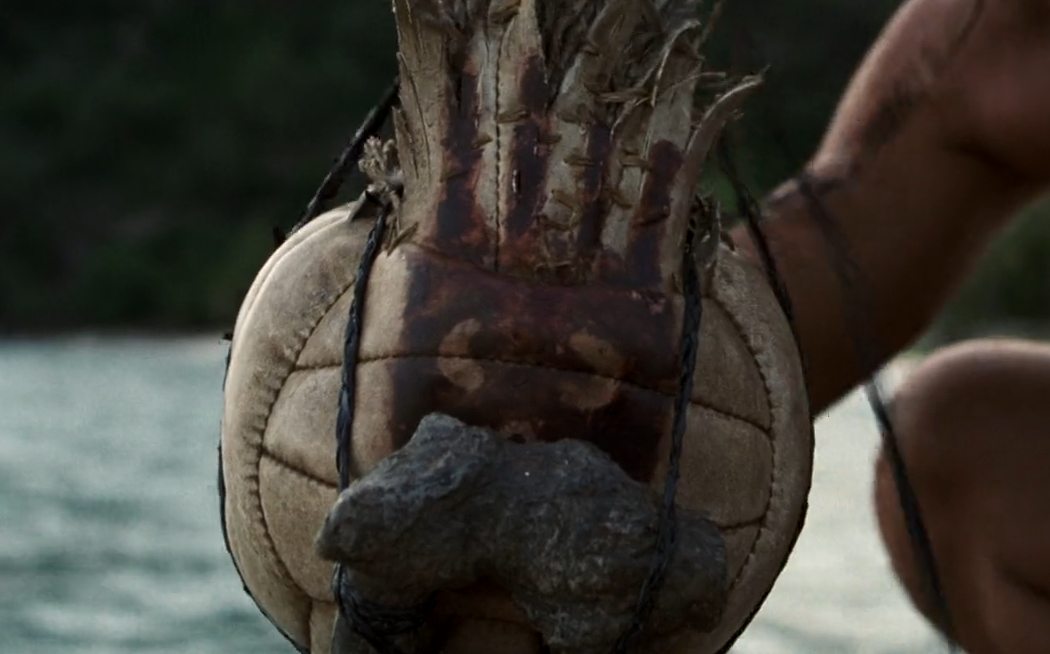

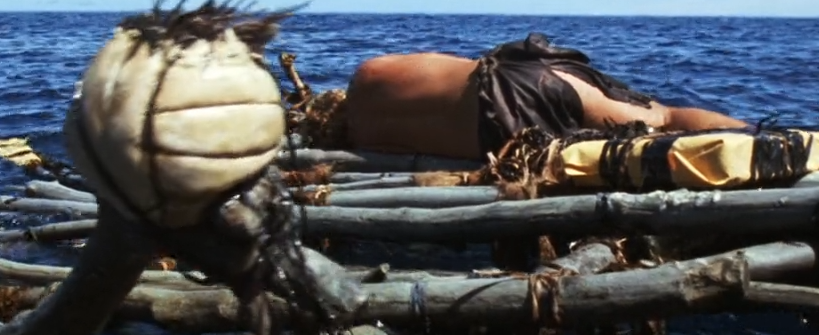
Cast Away (2000) is a movie about Tom Hanks and Wilson having a four-year ordeal on an island, bookended by a before/after romantic narrative wherein Tom Hanks works so hard for FedEx that he just might not get married to Helen Hunt. It is rated PG-13 for existential dread (with loss/grief/despair overtones), "cruel but beautiful mother nature," a body horror moment, and romantic relationship negotiations.
In the pre-September 11th era, Cast Away’s heavily-wrought symmetry, internal neatness, and brutalist dramatic irony were sufficient for the New York Times to call it "a bravura mastery of tone and timing." Fifteen years later, however, viewers are used to "being punished," and chaos, helplessness, and nihilism all have established places in popular entertainment. Now that we’re in "the ordeal era," the threshold for "bravura mastery of tone and timing" has been pushed. Here are some thoughts for anyone trying to reach that threshold in a Cast Away remake.
"The crazy news" when Tom Hanks gets back in Cast Away is "The Houston Oilers are now the Memphis Titans." This was meant to communicate the impactlessness of world events on boring American life, but this late-90s worldview has since expired. A better setup would be Tom Hanks reading the paper on September 11th, 2000, and it’s a boring late-era Clinton headline like "Tim Commerford got in trouble for climbing on the set at the VMAs."
Tom Hanks does not need a byzantine international professional life for an emergency solo holiday-season flight over international waters to be called for, and if Hanks had an unspecified personal or professional reason for travel, FedEx could get out of the movie’s mainland shots.
The ironic impact of Tom Hanks being an "efficiency expert" who lands on "an island where he has nothing but time" is cheesy and can go.
In Hook (1991), Robin Williams is a hard-working lawyer with no time for being a good dad, who becomes Peter Pan after a holiday-season international flight to visit Maggie Smith. Robin Williams had a phone in 1991, so Tom Hanks should have had a phone in a 2000 movie set in approximately 1996, not a beeper. A remake should take this into account.
Only minimum initial development is required to create drama around an anchor/doubt "leaving and coming back" relationship vector. If Helen Hunt and Tom Hanks spend 3 minutes of pre-marital screen-time, have a brief sex scene, and Helen Hunt asks if she should come on the trip but Tom Hanks says "Don’t worry about it," we’re solid, that’s the setup. This shouldn’t take 20 screen minutes.
Re: sex scene, "in-shape" Tom Hanks’s post-island bod is unaddressed in the original Cast Away. An "out-of-shape/90s Tom Hanks" sex scene would make the film’s latent sexual tension pop, and it would further dramatize the change Tom Hanks's body undergoes on the island… "What’s he gonna do with that once he’s back?"
Meanwhile, did Helen Hunt or anyone not notice that Tom Hanks became jacked?
The plane bad-luckily crashes and Tom Hanks super good-luckily gets out of it. The "fickle hand of luck" situation in this movie should stop there. The crash should not be within a night's waves' distance to a habitable deserted island. Tom Hanks should not have a bunch of supplies made available via in-transit Christmas gifts. Tom Hanks should not have a sailing certification as revealed earlier by a casual pan across his mantlepiece.
Remake producers are advised to watch Groundhog Day (1993), in which a reptilian but situation-aware Bill Murray repeats the same day endlessly while learning to be a Good Man via side paths branching off of iteratively trying to hook up with Andie MacDowell; and Edge of Tomorrow (2014), in which a cowardly Tom Cruise learns to be brave by training with Emily Blunt to iterate on knowledge and skills relevant to the battle-milieu surrounding a time-manipulating alien, dying repeatedly and each time "going back to the start" because, during the first iteration, a special alien slimed him.
What’s the rush in Cast Away? Four years is a long time but like, it’s not that long. Director Harold Ramis estimated that Bill Murray looped through Groundhog Day for 10 years… a fan website’s close reading puts the estimate at closer to 35. Estimates on Tom Cruise’s time in Edge of Tomorrow vary, but the movie suggests an insane depth of technical knowledge and recognition through repetition that can’t have been a fast achievement. Daniel Defoe put Robinson Crusoe on his island for 28 years, two months, and 19 days. But when Tom Hanks gets back Bill Clinton is still president.
The main pleasures of the movie are Tom Hanks’s iterative learning and endurance through a mind-melting ordeal, and the movie’s wider narrative hinges on "what the interaction will be like" with Helen Hunt upon return. A remake can crank all these up by making Tom Hanks deal with the island for way, way longer. (Meanwhile, "aging" somehow isn’t part of the original at all. Maybe see also Forever Young (1992), in which a cryogenically frozen 1930s Mel Gibson gets woken up in the early 90s to commandeer a B-25 bomber and find/propose marriage to a very old Jamie Lee Curtis.)
It’s amazing that Tom Hanks’s very first DIY ocean boat is seaworthy, and that he launches it without any trouble. Why don’t we see Tom Hanks make this attempt three or four times over the course of two hours, with successively better boats? We would’ve also enjoyed seeing the process of figuring out & marking the light on the cave wall as a marker for the seasons passing; the development of Hanks’s knowledge of patterns in the tides and winds; his process of making tools; a more prolonged repetitive disgust/comedy routine at eating coconuts and crabs "again;" how he developed and applied materials for his cave art; how he learned to spear fish; more on his deepening relationship with Wilson to crank the pathos when Wilson dies at sea; and especially more on Tom Hanks just being bored, unmotivated, and despairing. Instead there’s a "Four years later" cut after the tooth scene, and suddenly Tom Hanks is buff and has everything figured out except how to get off the island. There should be no such cut in a remake. The amount of total time passed should be unclear to the viewer unless they pay attention to the marks accumulating on the cave walls, and the viewer should be as surprised as Hanks by "how much has changed" upon return. (Al Qaeda, Patriot Act, Bush-era, first African American president, iPhone, Prius, ISIS, compact discs are worthless, thinkpieces, trip metal, etc.)
The remake should require a multi-year shooting schedule and commitment from its actors to show realistic aging, body transformation, and natural changes in growth and resources on the island; producers should note e.g. Boyhood (2014). The movie should begin filming immediately so that Tom Hanks, at a pudgy 59, can finish the movie completely ripped at age 70.
The nastiest depicted thing that happens in Cast Away doesn’t even have to do with the island, and the worst thing that has most to do with the island is only related later in monologue:
It’s made clear in mainland Cast Away that Tom Hanks has Chekhov’s bad tooth. On the island he removes it by placing an ice skate’s blade against the tooth and knocking it with a rock. This would be immensely painful, but would it work? The first time? Without damage to other teeth? Why didn’t it get infected? And why, of all of the horrible physical adjustments required by the island, is this miscellaneous other thing he "brought with him" the worst? Because it’s visceral? Why not have Tom Hanks fall off something and break his arm, then have the arm’s recovery be a unifying subroutine/challenge as he learns to do the things described above, up to and ultimately building a boat that works?
Worse: Why does Tom Hanks do a monologue about his contemplated suicide to Wilson instead of having that process depicted on screen? Isn’t suicidal despair and boredom the movie’s primary antagonist, and shouldn’t the tension around learning to make rope and making a noose plus the depicted moment of his methodically testing the hanging and then changing his mind and re-resolving to "escape to sea" be the movie’s emotional turning point?
The container ship crew probably wouldn’t notice Tom Hanks’s raft (cf. All is Lost (2013)) but let’s allow that it does. Does the ship’s wave capsize him? What does a container ship slowing to a stop and deploying a rescue crew look like? What’s Tom Hanks’s first interaction with humans in however many years like? Where is he taken and how? By what process is Helen Hunt and his larger family alerted to his rescue? What are his initial reactions to the world? Is he terrified? Is it sorta funny? Whyyy does Cast Away cut ahead by four weeks at this point?
I laughed when Hanks joked to Wilson that his dentist was named Spalding… but extremely groaned that Helen Hunt’s new beau once gave Tom Hanks a root canal, and was "referred to him by Spalding." Why must this be so neatly connected, and why can’t Helen Hunt’s new man just be some miscellaneous guy?
How is it possible that Tom Hanks’s ass is never fully shown in this movie?
Why the portentous long shot of the flashlight left running when this turned out to not affect anything?
Why doesn’t Tom Hanks ever get diarrhea or nausea? Did he never once masturbate or try in a moment of degradation/desperation to fuck something?
Did that guy who says "We gotta go catch up on our fishing now!" not understand that this was not a moment for an acquaintance to propose a casual plan?
When Tom Hanks wounds himself on the reef while swimming in after failing to row out to sea on the life raft, why doesn’t this matter or come back up? Since "wounds" are such a concern in the first island moments of Cast Away, shouldn’t their treatment and healing also be?
It makes more sense for Tom Hanks to have the shitty multitool he had on his keys than for a pair of ice skates to wash up that he’s able to fashion into a perfect axe and for him to have a sailing certification. Just having a multitool would be luck and "plausible preparedness" working at scale.
There shouldn’t be a mcguffin envelope, since the mcguffin is an extremely stupid narrative device. (Fwiw, Wikipedia notes that Cast Away’s mcguffin is shown in a deleted scene to contain two containers of salsa verde.) If Tom Hanks paints anything on the sail he should paint Helen Hunt or Wilson, not angel wings with circles around them. If an artist must be depicted in the remake of Cast Away, that artist should not make one single, terrible artwork repeatedly, or something that is easily approximated by Hanks with materials he is able to somehow refine on the island.
Why didn’t he undress the dead guy who washed up further, because it would have been gross? Why didn’t he eat the crab that was stuck to the dead guy’s leg, also too gross?
Why couldn’t he use the deflated rubber raft as a sail? Why did he have to wait for a destroyed portable toilet in the apparently perfect shape of a usable sail to wash up?
Probably way too cruel & bummer for even "the ordeal era," but what if when Tom Hanks got back, the "big news item" Helen Hunt shared was, "Barrack Obama is the first African American president," and it was revealed at the movie’s ending via some terrible remark that you the viewer had been rooting for a piece of shit racist the whole time?
There should be no orchestral score in the remake of Cast Away at all, unless it’s Ravel "Bolero" played repeatedly until the suicide test, after which point there is no longer any music.
The remake should be called "Castaway" with no space, or something else entirely.
Wouldn't this be fresher if it was Helen Hunt stuck on the island and doing all this stuff?
